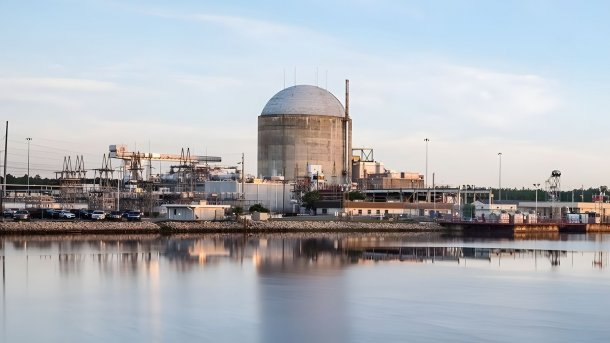AI server with atomic drive
Amazon, Microsoft and Google secure nuclear power in the USA to supply their power-thirsty (AI) data centers.

Duke Energy's Robinson Nuclear Plant near Hartsville, South Carolina.
(Image: Duke Energy)
The power consumption of data centers is currently growing rapidly worldwide. The drivers of this development include AI computing accelerators, which consume an enormous amount of energy.
To ensure that the power supply does not stifle the AI boom because electricity becomes scarce or too expensive during peak load phases, large operators of data centers are securing production capacities directly from the producers.
Industry experts fear that such supply contracts could have a negative impact on other electricity customers, such as private individuals. This is because electricity could become scarce and expensive in some supply zones if there is a lack of generation, transmission or storage capacities.
It is precisely such problems that large companies want to avoid through so-called Power Purchase Agreements (PPAs). They are also securing their climate targets with supply contracts for nuclear power, which is considered CO₂-neutral. It recently became known that Microsoft, for example, has not yet complied with its own plans for climate neutrality due to rapidly growing electricity consumption.
Videos by heise
Data center next to nuclear power plant
Back in March, global cloud market leader Amazon Web Services (AWS) purchased a large data center in Pennsylvania, which is located right next to Talen Energy's Susquehanna Steam Electric Station nuclear power plant. The 960-megawatt data center draws its electricity from this 2.5-gigawatt power plant. For the "Cumulus Hyperscale Data Center", Talen originally planned 475 MW for cloud servers and 300 MW for "Coin Mining and other Blockchain Applications".
(Image: Talen Energy)
A few days ago, Amazon, Google, Microsoft and the steel manufacturer Nucor announced long-term electricity supply contracts with Duke Energy from North Carolina. Microsoft and Google, among others, operate and build large data centers in this region.
The aim is to develop special tariffs with major customers to generate more CO₂-free electricity in future - including through the aforementioned companies' own plants. These include tariff models with names such as Accelerating Clean Energy (ACE) and Clean Transition Tariff (CTT).
Duke Energy already operates eleven nuclear power plants, as well as gas and pumped storage power plants. Duke is also planning to build a number of so-called "mini-nuclear power plants", i.e. Small Modular Reactors (SMRs).
In many regions of the USA, however, the electricity grids are also in need of renovation. As a result, new large-scale electricity consumers cannot always be located in the desired location.
Lots of electricity from (fracking) gas
In the USA, a significant proportion of electricity is generated from gas, partly because gas from fracking (shale gas) is relatively cheap there, and many new wells are being drilled. Some investment consultants expect that the AI boom will also lead to rising profits for gas-fired power plants and gas producers in the USA.
In Germany, Microsoft has probably secured 323 MW of power from Germany's largest solar park to date, Witznitz in Saxony, to supply data centers through a PPA with Shell Energy Europe.
(ciw)